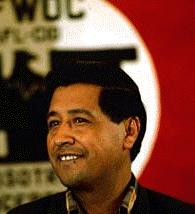 |
In this lifetime we have known of many heroes from Judith Blair who donated one of her kidneys to save someone’s life to Martin Luther King who wanted blacks to be treated equally in society. That’s something that Cesar Chavez also wanted to do making him a “special hero." Although it has been more than a decade since his fallen death, he will always be a hero, and not just to me, but for all those hardworking people that worked in the fields. Although his achievements did not change anything in the constitution, he made his voice heard by everyone. He will always be remembered by the Mexican community "Porque el fue un hombre que pelio por su gente.” "He was a man that fought for his people."
Cesar Estrada Chavez was born March 31, 1927 near Yuma, Arizona. Cesar was born to Librado and Juana Estrada and was the second of five children. Chavez began school at age 7, but he found it difficult because his family spoke only Spanish. Chavez preferred to learn from his family. Many times, his teachers were neither friendly nor helpful. The teachers of migrant children often felt that since these children would soon move on to other farms in other towns, teaching them wasn't worth the effort. Teachers were even prejudiced against Spanish-speaking students. "When we spoke Spanish," Chavez remembers, "the teacher swooped down on us. I remember the ruler whistling through the air as its edge came down sharply across my knuckles. It really hurt. Even out in the playground, speaking Spanish brought punishment." At the age of ten Cesar's father made a business deal with a neighbor who did not keep his part of the bargain. In the end, the Chavez family lost their farm and all their belongings. It was 1937, the period following the Stock Market crash. To make matters worse, the Southwest was experiencing severe droughts. Despite all the obstacles and racist teachers, I admire Cesar for managing to graduate from school. Instead of just dropping out, he finished middle school and back then, to Hispanics, this was a great achievement.
After graduation he began to work full-time in the vineyards. Soon Cesar started to notice that labor contractors and landowners exploited the workers. He tried speaking to them about higher pay and and better working conditions, but they would not even bother to listen to one word. Not even his fellow workers would support him because they feared that they would lose their job. Cesar stood alone and could not do nothing at all. In 1944, he joined the United States Navy and fought in WW2. Then he returned to work in the fields again. In 1948, he married a young woman named Helen Fabela, who shared the same problems as he did.
One day, a man from the local Community Service Organization wanted to recruit Chavez. At first, Chavez was suspicious of the man because he was "white." Chavez became a part-time organizer for the group. He registered more than 2,000 workers in just two months. But he was so busy helping the farmworkers that he neglected his own work and ended up losing his job. This is what makes someone not only a hero, but a good person dedicated to taking time out of his own life to help people out. I honor Cesar for not only helping his people out, but for standing up for his people.
Cesar soon became involved with many more people and activities with the support of a lot of people to fight for farmworkers' rights. But in the end, "He always made his voice heard," said his wife. Although Cesar had support from a lot of people, there were many who didn't support him. But that didn't stop him from making his voice heard. That is another reason why he is my hero because he did not let anyone or anything get in his way of helping other people out.
Despite all the trials and tribulations, Chavez helped Mexican farmworkers. He achieved getting their wages increased and also gained labor rights for them. After that Chavez still kept working, but not only for the people that worked in the fields, but for Hispanic rights as well. In the end Cesar accomplished many things. He won many people's trust and hearts for helping them out and fighting for them.
Page created on 8/10/2014 1:16:19 PM
Last edited 8/10/2014 1:16:19 PM
unknown. "Cesar Chavez." [Online] Available www.americaslibrary.com.
